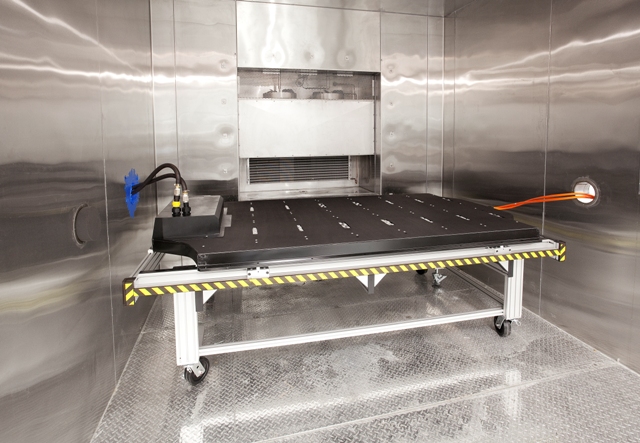Tesla Motors and its normally outspoken CEO, Elon Musk, haven't had much to say about its plans to build a battery "gigafactory" lately.
Now, a new report claims Tesla has secured an important pact in making the gigafactory a reality.
Tesla has reached an agreement with Panasonic--its current supplier of lithium-ion cells--that will allow the gigafactory project to move forward before the end of the year, according to the report in Nikkei Asian Review.
DON'T MISS: Tesla's Lithium-Ion Battery Gigafactory: What You Need To Know
The so-called gigafactory, to be located in the western U.S., would be the largest lithium-ion cell factory in the world. It's needed to support Tesla's plans for greatly expanded electric-car production.
While Panasonic previously expressed skepticism regarding Tesla's ambitious lithium-ion cell plans, it now appears the electronics giant will participate in the gigafactory's construction.

Tesla Motors - Model S lithium-ion battery pack in environmental test chamber
That means Panasonic could end up footing the bill for $1 billion of the total $5 billion anticipated investment required for the gigafactory.
As well as supplying lithium-ion cells to Tesla, Panasonic owns a small share of the electric-car maker.
Under the terms of a previous contract negotiated in October 2013, the electronics company will supply Tesla with 2 billion cells between 2014 and 2017, to be used in its Model S sedan and Model X crossover vehicles.
The gigafactory is expected to come online at the end of that three-year period.

Slide showing candidate states for Tesla Motors gigafactory, from Feb 2014 presentation
Tesla has narrowed the choice of site (or sites) down to four states (Arizona, Nevada, New Mexico, and Texas) and is expected to break ground before the end of the year, with equipment installation to take place sometime in 2016.
Cell production needs to be in full swing by 2018 to ensure a supply of battery packs for the upcoming Tesla Model III, a mid-size electric sedan with a 200-mile range that Tesla says will cost around $35,000 and enter volume production that year.
Neither Panasonic nor Tesla had commented on the deal by the time this article was published, but an official announcement will reportedly be made in the coming weeks.
[hat tip: Patrick Sandham]
_______________________________________________












